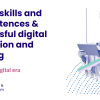Adult Education Initiative - Latvia
The Adult Education Initiative in Latvia, set within the context of the project "Improving the Professional Competence of Employees", aims to do exactly what its title suggests - enhance the professional competence of those already employed. Ultimately, the goal is to address the mismatch between labour market skills and demand in a timely manner, promote overall competitiveness, and raise productivity levels across sectors.
The Adult Education Initiative is funded by the European Social Fund together with Latvian state funding, adding up to a total budget of over 45 million EUR. It is implemented by the Latvian State Education Development Agency, in cooperation with municipalities, educational institutions, and the State Employment Agency in Latvia. It is running from 2017 until the end of 2023.
Background and context
The Adult Education Initiative is ran by a range of partners, comprising of municipalities, who act like adult education coordinators, and educational institutions. Municipalities work to aggregate training offer and training needs, disseminate information about career services and offer employment advice, and promote the project so it reaches more people. Educational institutions, engaged in the project, are responsible for the actual. day-to-day implementation of vocational education and training programmes, as well as other types of learning, including: professional development and non-formal education programmes, study modules and course, individual profiling, and assessment of the professional competence acquired outside of the formal education system. The Latvian State Employment Agency, which also takes part in the project, supports career advisor services and enhances partners' actions.
Conditions to participate
Any employed or self-employed citizen between the ages of 25 and unlimited, including young parents on parental leave that have continued working, and working pensioners, as well as persons with alternative status, could apply for the education programmes made available by the project.
Training type and benefits
- Continuing vocational education and training programmes (480-1280 hours), leading to obtaining a certificate of qualification and gaining a profession.
- Professional development programmes (160-320 hours) leading to a professional development certificate.
- Non-formal education programmes (max 159 hours) leading to certification.
- Modules or sets of modules, which consist of a set of different knowledge, skills and competences and leading to a licence.
- Study course or modules at universities or colleges. They can be followed by a certificate.
Assessing professional competence acquired outside the formal education system
If the skills required for the labour market are already acquired in the world of work or elsewhere, a worker aged 25 or over may take advantage of the opportunity to assess their professional competence acquired outside the formal education system.
A tailored approach to profiling individual workers, regardless of their education level
To ensure a tailored approach, the project also conducts individual profiling of employees, with a focus on those left behind. This includes the initial analysis and subsequent counselling according to profiling results. Based on the results, each employee can go and study either a module, or a set of modules, identified as beneficial and containing the potential for needed knowledge, skills, and competences. Following the completion of the module or respective course, each employee receives a certificate of accreditation.
Why is this a good practice?
The project, which kicked off in 2017, has seen 9 rounds of training take place already, a sufficient time to draw lessons learnt and discover gaps in knowledge and structure that could be addressed. For example, a particular emphasis was placed on education programmes that correspond to the DigComp proficiency levels of the EU Digital Competence Framework (DigComp).
Given the horizontal impact of digital skills across all sectors, a particular emphasis was placed on education programmes corresponding to DigComp Levels 1-6 of the Digital Competence Framework. The project offer was therefore adapted to include an additional focus on foundational, intermediate and advanced skills, already mapped out in competence areas by the framework. The list of educational programmes on offer is broad in terms of sectors (covering virtually all of them) - an aspect that contributes to the project's accessibility.
The Adult Education Initiative has reached considerable results in terms of number of employees reached. While final project data and results are in the process of being analysed (and will be made available by the start of 2024), more than 70.000 Latvian citizens have taken part in some form of adult learning.
The project is co-financed under the European Union Funds Operational Programme “Growth and Employment” specific objective 8.4.1 “Creating the professional competence of employed persons” of the European Social Fund project “Enhancing the professional competence of employed persons” (project No 8.4.1.0/16/I/001).






